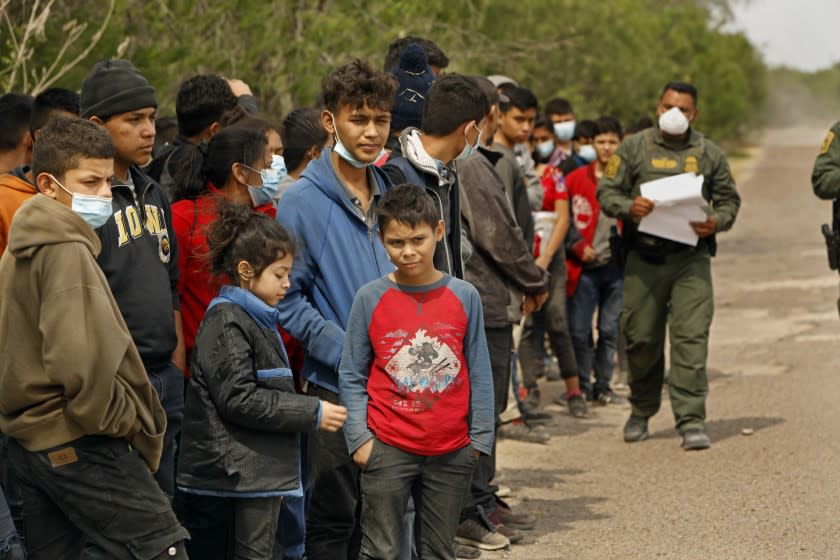Under Biden immigration change, more Central American children may join family in U.S.

- Oops!Something went wrong.Please try again later.
Under new Biden immigration policy, far more Central American children could be reunited with family members already in the United States.
The Biden administration on Tuesday announced the major expansion of a program that would allow many such youths into the country legally, part of its stated goal to increase "legal pathways" for immigration. The changes could boost the number of Salvadoran, Guatemalan and Honduran children joining their families in the U.S. from several hundred to tens of thousands.
"It could be a substantial increase, and we hope it will be," a senior administration official said in an interview, speaking on condition of anonymity to brief a reporter on the policy before its formal announcement.
"This is going to be a lifesaving measure for so many children in danger," said Daniella Burgi-Palomino, who handles immigration issues for the Latin America Working Group, a Washington-based advocacy and research organization. "This is not going to help absolutely everyone ... but so many more children will have access."
The Central American Minors program, as it is known, focuses on children and youths from the so-called Northern Triangle countries of the region just south of Mexico. The countries, which produce the majority of migrants attempting to reach the U.S. border, are a priority target for President Biden in his efforts to improve the immigration system and make it more "humane" and orderly, a task he has assigned to Vice President Kamala Harris.
Harris, during a recent tour of Mexico and Guatemala, repeatedly emphasized the need for legal ways for migrants to travel to and remain in the U.S., reducing the illegal, chaotic and dangerous journeys that thousands attempt to make.
The Central American Minors program had allowed parents living legally in the U.S. to petition to have their children reunited with them. And it allowed those attempting to go to the U.S. to apply and await the processing of their applications in their home countries.
Former President Trump abruptly shut down the program in 2018, stranding more than 3,000 family-reunification cases already being processed.
Biden, vowing to end some of what he termed Trump's more cruel policies, issued an executive order on March 10 that revived the program. U.S. immigration and State Department officials began attempting to relocate the pending cases, reaching around 1,100 as of now, the administration official said.
"We see this as righting a wrong," the official said.
Tuesday's decision vastly increases the potential pool of children who will be allowed to seek entry. It expands the categories of adults who may petition for children to join them, adding to the mix legal guardians and parents whose legal status in the U.S. is still being processed, including those with pending asylum cases or applications for what is known as a U visa given to victims of violence, the official said.
The official said there could be at least 100,000 newly eligible petitioners.
Many of the children and youths — who must be unmarried and younger than 21 — also will be allowed to avail themselves of the U.S. Refugee Admissions Program, which provides numerous benefits and is also being expanded by the Biden administration, the official said.
"We are firmly committed to welcoming people to the United States with humanity and respect, as well as providing a legal alternative to irregular migration," Secretaries of State Antony J. Blinken and Homeland Security Alejandro N. Mayorkas said in a joint statement.
They reiterated that the expansion of this program was part of a broader effort to provide additional legal access to safer immigration.
The Biden administration has come under criticism from the left for failing to end some Trump-era policies that continue to see immigrants turned away from the border, including those legally seeking asylum. And from the right, Biden, and especially Harris, have faced withering criticism for an increase in the numbers of people arriving at the border, encouraged by a perception that this government will be more lenient on migrants, and for failing to stop it.
The Central American Minors program was established during the Obama administration following the arrival of thousands of unaccompanied youths at the southern U.S. border in 2014.
At the time, the Obama policy was criticized by some in the immigration-advocacy community for setting too narrow a pathway because few families met the criteria to apply for retrieving their children.
If the new expansion succeeds, "it could potentially take a much bigger bite" out of the huge numbers of children and young adults hoping to migrate northward, said Julia Gelatt, a senior policy analyst at the Migration Policy Institute in Washington.
"The goal, before and now, was to provide an alternative to the really dangerous trip so many are taking," she said.
The in-country processing will resume with Tuesday's announcement, administration officials said. Advocates warned against allowing burdensome backlogs to form in El Salvador, Guatemala or Honduras, with screening, interviews, vetting and cross-border paperwork that delay and ultimately discourage applicants, some of whom feel too at risk to wait it out.
This story originally appeared in Los Angeles Times.

